Global Airport Services Market - Comprehensive Data-Driven Market Analysis & Strategic Outlook
The global airport services market, which functions within the aviation and travel industry, will continue to undergo alterations fueled by shifting passenger expectations and operational needs. Its transformation is traced back to early commercial aviation times when airports were small hubs with mere basic facilities such as check-in desks and basic baggage handling. With the passing of time, as aviation expanded beyond the elite to the masses, the market began to emerge in response to the growing complexity of airport operations and the requirement of more formalized support services.
- Global airport services market size of approximately USD 225.4 Billion in 2025, increasing at a CAGR of around 14.4% during the forecast period from 2032 with the possibility of exceeding USD 578.3 Billion.
- Aircraft Ground Handling Services hold an approximate 48.1% market share, driving innovation and greater applications by conducting intense research.
- Key growth drivers: Increasing air travel demand and passenger traffic, Airport infrastructure development and modernization efforts
- Chances include: Adoption of innovative technologies such as automation, AI, and IoT for hassle-free airport running
- Key observation: The sector will grow exponentially in value over the next ten years, suggesting bountiful opportunities for growth.
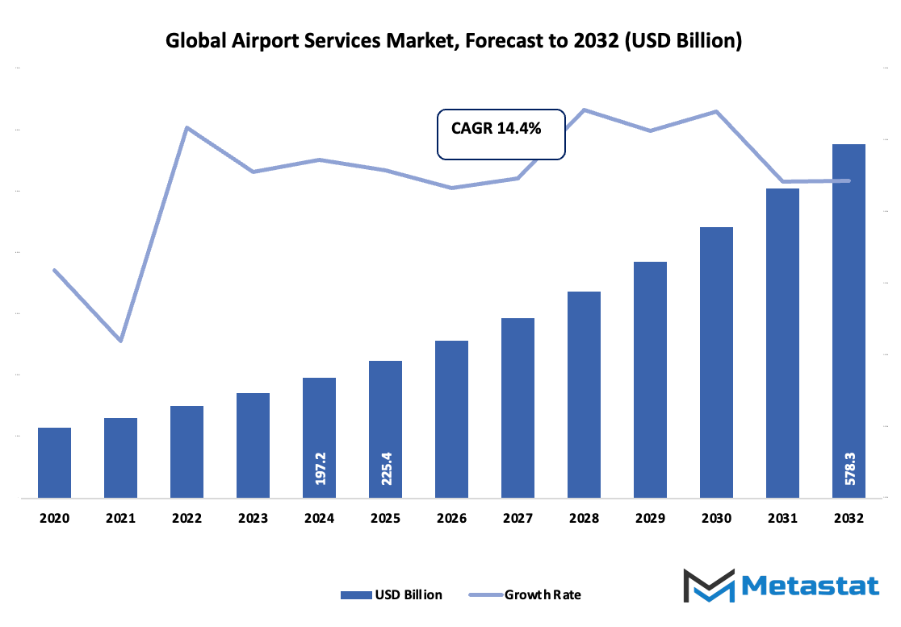
During the 1960s and 1970s, the beginning of the first big landmark was when airports and airlines began outsourcing ground handling and maintenance services. This was the beginning point where specialized service providers entered the scene to offer solutions for passengers' support, washing of aircraft, refueling, and cargo management. The 1980s and the 1990s witnessed regulation in most markets, allowing private operators to compete alongside the traditional airline-controlled service, thereby accelerating innovation and operational enhancement. Advances in technology throughout this decade, such as automated baggage handling and early digital check-in machines, will continue to shape how services are delivered in the next couple of years. The start of the millennium saw shifting consumer demands. Travelers began requesting faster, more efficient travel experiences, and airports were pushed to accommodate larger aircraft and increasing numbers of passengers. International airport service industry developed by adopting greater volumes of IT systems, automated machines, and integrated baggage tracking solutions. Security protocols, always developing against international threats, will keep on realigning operational priorities with efficiency being weighed against security. In the future, the industry will be increasingly integrated with artificial intelligence, robots, and data-based technologies to enhance passenger handling and operational performance.
Airports will prioritize personalized service, predictive maintenance, and sustainability measures that reduce environmental impact. Regulatory environment changes will also guide the standards of service to conform while influencing innovation. As it moves along its trajectory from humble beginnings to a technologically driven environment, the world airport services industry will continue to redefine airport operations and consumer perception of air transport, demonstrating its ability to respond constructively to the changing aviation environment.
Market Segments
The global airport services market is mainly classified based on Service Type, Airport Type, Infrastructure Type.
By Service Type is further segmented into:
- Aircraft Ground Handling Services: The global airport services market will witness rapid growth for aircraft ground handling services as airports adopt computerized systems and advanced logistics. With the rise in passengers and movement of aircraft, effective handling will be a necessity. Trends in the future will be with increasing turnaround speeds, baggage automation, and eco-friendly machinery to meet global aviation demand.
- Aircraft Maintenance Services: The global airport services marketwill see strong growth in aircraft maintenance services due to tighter safety standards and new aircraft technologies. Predictive maintenance, AI-driven inspections, and green repair solutions will be increasingly sought after. Airports will spend money on modern facilities for supporting fast and secure aircraft operations worldwide.
- Passenger Services: Digital technology, biometric recognition, and seamless check-ins will enhance passenger services in the global airport services market. Convenience, security, and personalized travel experience will be at the center of future advancement. With more air traffic, airports will work towards shorter delay times and ease of passenger flow by using intelligent infrastructure and service innovation models.
- Other: The global airport services market will expand to other service areas such as cargo handling, catering, and security management. Greater international trade and customer expectations will force airports to develop other support systems. Future developments will rely on digital technology, green sustainability practices, and combined service platforms to keep airports efficient.
By Airport Type the market is divided into:
- International: The global airport services market will see international airports drive significant revenue expansion through cross-border travel, tourism, and international trade growth. Strategies of the future will involve large-scale airport modernization initiatives, capacity enhancement, and green operations to tackle increased passenger and cargo traffic across several global destinations.
- Domestic: The global airport services market will expand in domestic airports, as connectivity within the region and low-cost travel stimulate demand. It will be fueled by expansion in passenger services, productivity gains, and cost-efficient solutions. Future investment will enable domestic airports to handle increasing traffic volumes and support regional economic growth.
By Infrastructure Type the market is further divided into:
- Greenfield Airport: The global airport services market will see more investment in greenfield airports with innovative designs, state-of-the-art infrastructure, and intelligent technology. New developments will prioritize green construction, renewable energy supply, and digital automation. Such airports will set new benchmarks for efficiency and passenger experience and serve the development of global air travel.
- Brownfield Airport: The global airport services market will continue to improve brownfield airports with expansions and renewals of existing infrastructure. Future investments will target enhancing runways, terminals, and servicing systems to handle increasing demand. Sustainable upgrades and digital innovation will continue to make older airports competitive and efficient in the international aviation market.
|
Forecast Period |
2025-2032 |
|
Market Size in 2025 |
$225.4 Billion |
|
Market Size by 2032 |
$578.3 Billion |
|
Growth Rate from 2025 to 2032 |
14.4% |
|
Base Year |
2024 |
|
Regions Covered |
North America, Europe, Asia-Pacific, South America, Middle East & Africa |
By Region:
- Based on geography, the global airport services market is divided into North America, Europe, Asia-Pacific, South America, and the Middle East & Africa.
- North America is further divided into the U.S., Canada, and Mexico, whereas Europe consists of the UK, Germany, France, Italy, and the Rest of Europe.
- Asia-Pacific is segmented into India, China, Japan, South Korea, and the Rest of Asia-Pacific.
- The South America region includes Brazil, Argentina, and the Rest of South America, while the Middle East & Africa is categorized into GCC Countries, Egypt, South Africa, and the Rest of the Middle East & Africa.
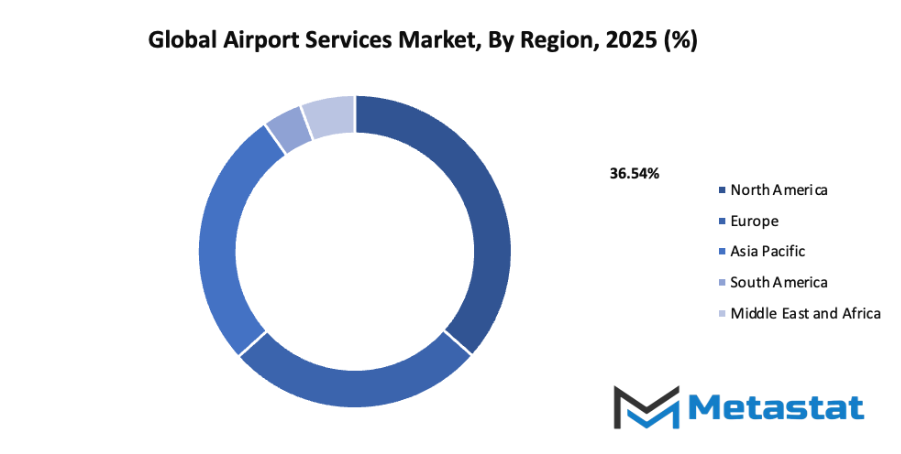
Growth Drivers
- Increasing air travel demand and passenger traffic: The global airport services market will benefit from the rising number of passengers choosing air travel as a preferred mode of transportation. Population growth, expanding middle-class income, and affordable airline options are key factors pushing this rise. This trend ensures airports require more service providers to manage traffic efficiently.
- Expansion of airport infrastructure and modernization projects: The global airport services market will see growth as major investments are made in airport expansions and modernization projects. Governments and private investors are funding new terminals, cargo facilities, and runways. These developments require specialized services, opening up new opportunities for companies to provide advanced solutions and efficient airport management.
Challenges and Opportunities
- High operational costs and labour intensity: The global airport services market will continue to deal with high costs due to fuel, manpower, and maintenance needs. Labor-intensive tasks such as baggage handling and security demand significant workforce investments. Managing expenses while maintaining efficiency will remain a major challenge for airport service providers worldwide.
- Stringent regulatory and safety compliance requirements: The global airport services market operates under strict regulatory frameworks and safety standards. Governments enforce policies covering passenger security, environmental impact, and service quality. Adhering to these rules increases operational pressure on service providers. While necessary for safety, such compliance adds complexity to running smooth airport operations.
Opportunities
- Adoption of advanced technologies such as automation, AI, and IoT for efficient airport operations: The global airport services market will increasingly depend on technology-driven solutions. Automated systems reduce wait times, AI assists in data analysis for smoother operations, and IoT ensures real-time tracking of baggage and equipment. These innovations help airports handle rising passenger traffic while ensuring cost efficiency and better service delivery.
Competitive Landscape & Strategic Insights
The global airport services market is shaped by a highly competitive environment where established international players operate alongside regional operators seeking greater influence. This competitive landscape reflects the ongoing expansion of global travel demand, increased investments in aviation infrastructure, and the growing need for efficient ground handling and passenger support solutions. Market leaders such as Swissport International Ltd., dnata of The Emirates Group, and Menzies Aviation have developed extensive networks that allow them to secure long-term contracts with major airlines, giving them an edge in scale and operational expertise. At the same time, regional competitors such as Hainan Airlines Ground Service Co. Ltd., Bangkok Flight Services, and Kuala Lumpur International Airport demonstrate how localized strategies and regional partnerships can sustain growth while responding to the specific needs of local markets.
The role of airport service providers extends beyond traditional ground handling, expanding into integrated solutions that include baggage management, aircraft cleaning, passenger assistance, fueling, and security services. The demand for efficiency, reliability, and technology-driven operations has intensified competition, pushing companies to innovate and invest in digital platforms, automation, and advanced logistics systems. For instance, biometric identification and smart baggage tracking are no longer considered optional but rather essential for improving turnaround times and enhancing customer experience. These technological advancements act as differentiating factors, giving an advantage to operators that adopt them early and integrate them seamlessly into day-to-day processes.
In the future, competition in the airport services sector will not only be determined by scale but also by adaptability. The ability to respond to changing passenger expectations, stricter regulatory frameworks, and sustainability requirements will shape the success of market players. Companies such as Fraport AG, Flughafen Zürich AG, and Aéroports de Paris (ADP Group) highlight this trend, as they integrate sustainable practices into service operations to meet environmental goals. This includes reducing carbon emissions from ground vehicles, optimizing resource use, and aligning with international climate agreements. Those who embrace sustainability as a strategic priority are likely to strengthen their reputations and attract long-term contracts with airlines that are also under pressure to demonstrate environmental responsibility.
Looking ahead, strategic insights point to a market where partnerships and collaborations will become increasingly important. Global alliances among service providers can expand reach, while joint ventures with local airport authorities may create new opportunities for revenue growth. Signature Aviation plc and Celebi Aviation Holding provide examples of firms that actively pursue partnerships to extend their service capabilities and expand market presence. The rising importance of Asia-Pacific markets, supported by rapid growth in passenger traffic and infrastructure development, suggests that regional operators will gain prominence, balancing the dominance of established Western service providers.
Market size is forecast to rise from USD 225.4 Billion in 2025 to over USD 578.3 Billion by 2032. Airport Services will maintain dominance but face growing competition from emerging formats.
The competitive landscape of the global airport services market demonstrates a balance between consolidation and innovation. Larger players continue to expand networks and invest in digitalization, while regional competitors leverage agility and local knowledge. Strategic insights suggest that the future will be shaped by sustainability, technology adoption, and collaborative models of operation. This direction indicates a market where efficiency, adaptability, and forward-looking strategies determine long-term success.
Report Coverage
This research report categorizes the global airport services market based on various segments and regions, forecasts revenue growth, and analyzes trends in each submarket. The report analyses the key growth drivers, opportunities, and challenges influencing the global airport services market. Recent market developments and competitive strategies such as expansion, type launch, development, partnership, merger, and acquisition have been included to draw the competitive landscape in the market. The report strategically identifies and profiles the key market players and analyses their core competencies in each sub-segment of the global airport services market.
Airport Services Market Key Segments:
By Service Type
- Aircraft Ground Handling Services
- Aircraft Maintenance Services
- Passenger Services
- Other
By Airport Type
- International
- Domestic
By Infrastructure Type
- Greenfield Airport
- Brownfield Airport
Key Global Airport Services Industry Players
- Swissport International Ltd.
- dnata (The Emirates Group)
- Menzies Aviation
- SATS Ltd.
- Celebi Aviation Holding
- Air General Inc.
- Hainan Airlines Ground Service Co. Ltd.
- LHR Airports Limited
- Acciona
- Kuala Lumpur International Airport (Malaysia Airports Holdings Berhad)
- Bangkok Flight Services (BFS)
- Aviapartner Group
- Signature Aviation plc
- Aéroports de Paris (ADP Group)
- Flughafen Zürich AG
- Fraport AG
- Hong Kong Airport Services Limited
WHAT REPORT PROVIDES
- Full in-depth analysis of the parent Industry
- Important changes in market and its dynamics
- Segmentation details of the market
- Former, on-going, and projected market analysis in terms of volume and value
- Assessment of niche industry developments
- Market share analysis
- Key strategies of major players
- Emerging segments and regional growth potential



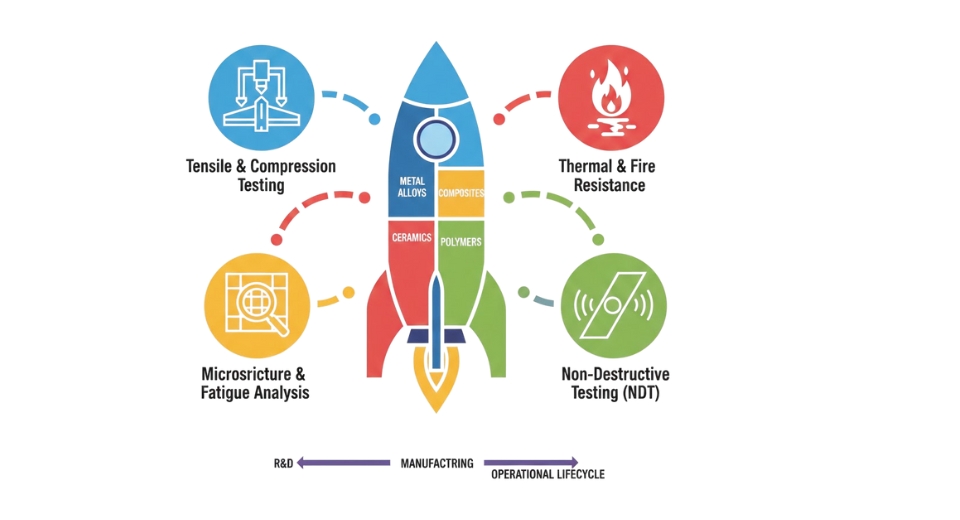
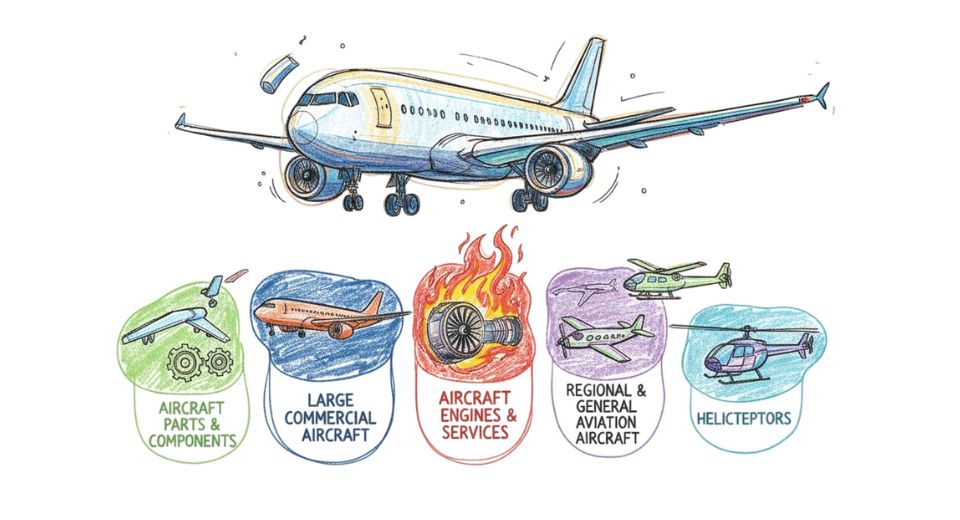
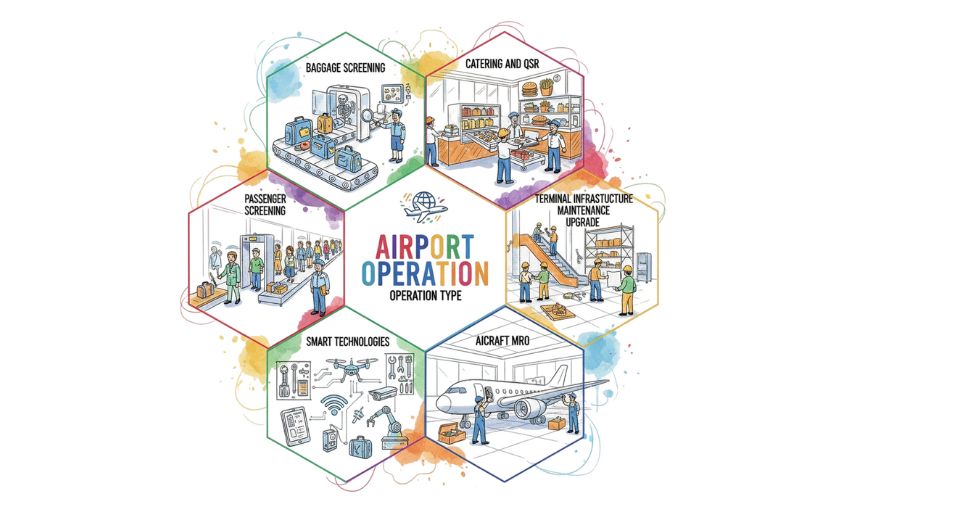


 US: +1 3023308252
US: +1 3023308252






